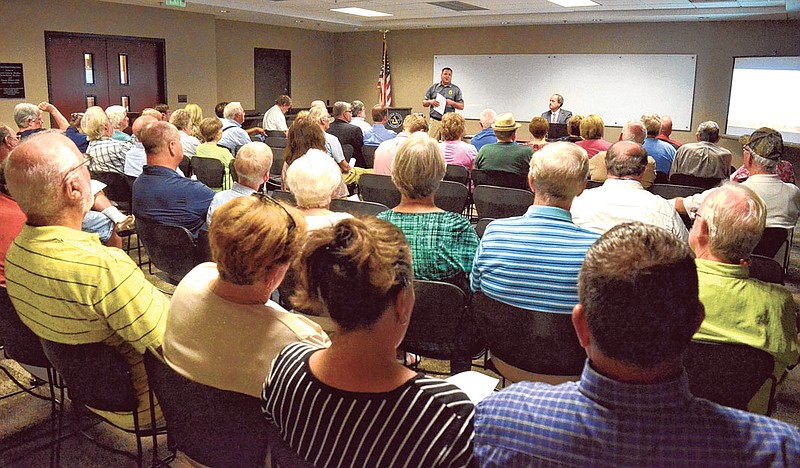I'd love to have this county out of debt by 10 years. But at the rate we're going now, we're looking at 20 years.
With a previously announced 20-25 millage rate increase on the table, in addition to a restructured fire fee, residents packed public hearings last week to voice opinions and hear the numbers broken down.
They got more than they bargained for. At the final hearing Aug. 24, Sole Commissioner Shannon Whitfield also approved a special district tax of 0.14 percent on the market value of properties in the county, on top of the previously proposed property tax increase of roughly 2 mills.
The new special district tax, which will expire at the end of 2019, will go specifically to pay off the county's lingering debt to Erlanger - which could have forced the county to raise its property tax rate by 7 mills.
In July, Erlanger won a summary judgment in the U.S. Court of Appeals that Walker County had to pay back what Whitfield estimated is $10 million with interest due to loans the county backed for the now-folded Hutcheson Medical Center.
And Erlanger is asking for the money now.
"I'm out of time, I'm out of resources and I'm out of money," Whitfield told attendees at the nearly four-hour meeting, describing the combined nearly $80 million in debt as "our inheritance" from the previous administration. "We know of no other option to make this fair and equitable."
Whitfield said he's met with Erlanger CEO Kevin Spiegel on several occasions to try to negotiate a deal, and recently made an offer to pay back $625,000 per quarter for three years, a figure totaling $7.5 million. It, too, was rejected, Whitfield said.
To gasps of shock, he explained that, per the court decision, Erlanger could have mandated a 7 mill property tax increase to recoup the hospital's losses, hiking the millage rate to over 16 mills and making Walker County's property taxes the highest of the nine surrounding Georgia counties.
"They can use a federal order to make it happen," Whitfield said. "And here's the thing - Erlanger is right."
The special district tax will be specifically earmarked so the only thing it can be used for is repaying the county's debt to Erlanger, said Whitfield.
Whitfield also approved a property tax increase of 2.189 mills in the incorporated areas of the county and an increase of 2 mills in the unincorporated areas of the county, placing the millage rate, respectively, at 13.129 and 9.838 per $1,000 of assessed value. In Georgia, a home's assessed value is 40 percent of its fair market value.
This should generate an additional $2.5 million per year, Whitfield said.
The restructured fire fee is expected to bring in an additional $75,000 this year. Whitfield said the reason for the change is due to the number of additional emergency resources larger properties demand when they catch fire.
"A 1,000-square-foot house paid the same as a 5,000-square-foot house," he explained. "That just wasn't fair and equitable."
The fire fee was established in 1994 as a way to provide fire services to the entire county rather than function through a subscription service, which Whitfield said would be more expensive.
Because the public service fee is replacing the fire fee, it will go into effect on residents' next tax bill.
Despite all the increases, Whitfield said the county still has to cut $4 million by Oct. 1 in order to balance the budget, and officials expect to see revenue drop by around $1 million in the upcoming fiscal year. That means even more will need to be shaved or raised, though Whitfield said additional options to raise funds are limited.
"I'd love to have this county out of debt by 10 years," Whitfield said. "But at the rate we're going now, we're looking at 20 years."
Email Shane Foley at sfoley@timesfreepress.com.
By the numbers
With the county $70 million in debt, not counting the estimated $10 million it owes Erlanger, Commissioner Shannon Whitfield is looking at a numbers game to get the county back in the black.Property taxUnincorporated area› 7.838: Previous rate charged per $1,000 of assessed value (does not include school tax)› 9.838: New rate charged per $1,000 of assessed value (does not include school tax)› $76: Annual increase for property valued at $100,000Incorporated area› 10.94: Previous rate charged per $1,000 of assessed value (does not include school tax)› 13.129: New rate charged per $1,000 of assessed value (does not include school tax)› $83.19: Annual increase for property valued at $100,000› $2.53 million: Total amount of additional revenue the increases will generate each yearSpecial district tax› 0.14: Percentage rate to be charged on the full market value of a property› $140: Amount to be charged annually on a $100,000 property› $1,000: Annual cap per property› $2.5 million: Amount the new tax will generage annually› 2020: Year the tax will cease› $7.5 million: Amount it will raise in that timeframePublic safety fee› $130: Previous flat charge for home- owners (commercial and industrial properties had a separate fee equation based on value and number of units)› $0.10: Universal amount charged per square foot of heated space under the new fee› $90: Minimum charge for homeowners› $400: Maximum charge for homeowners/minimum charge for business owners› $1,500: Minimum charge for industrial plants› $3,000: Maximum charge for business owners› $15,000: Maximum charge for industrial plants› $75,000: Additional amount the county will bring in this year under the new breakdown
